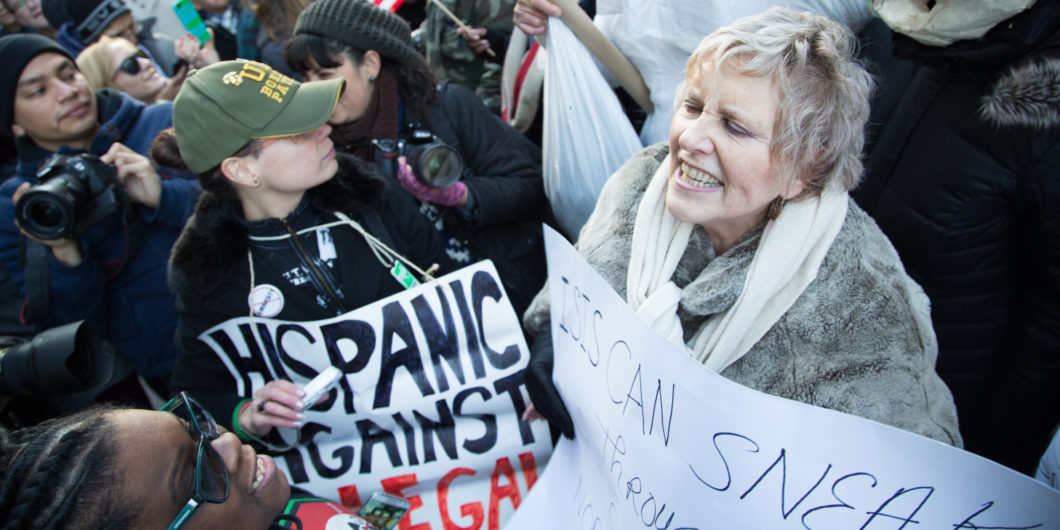Deneen’s critique of liberalism looks a lot like that of a radical leftwing philosopher, the late Sheldon Wolin.
Psychologizing Partisanship
People of every age think that their times are unprecedented. In a sense they must be right, for history does not repeat itself, except (at most) analogically. And if politics in the United States had been polarised before, the current extreme polarisation seems to have a new and especially embittered quality to it, such that the only way in which people of differing political outlooks can be in a room together in a reasonably sociable fashion is by holding their tongues and avoiding many subjects. If not, the temperature rises at once and real hatred or contempt emerges. This is not a good augury for a free society, though it is perfectly compatible with a democratic one, if by democracy is meant the rule of the majority. The distinction between freedom and democracy is not one that Ronnie Janoff-Bulman, author of The Two Moralities, makes.
An emeritus professor of psychology, she is alarmed by the polarisation of politics in the United States, but the title of her book seems hardly likely to assist in healing the breach. By using the definite article, she suggests that east is east and west is west, and never the twain shall meet. If the book had been titled Two Moralities, rather than The Two Moralities, a compromise might have been hoped for; but the use of the definite article forces a choice between them.
The book is only partly psychological in subject matter and is mostly a straightforward political tract in defence of Democrats and in criticism of the Republicans (especially, but not exclusively, under Donald Trump). Insofar as there is a psychological component to the book, it is to characterise conservatives as rigid, punitive, xenophobic, authoritarian, and selfish, and liberals as flexible, forgiving, cosmopolitan, freedom-loving, and altruistic. At the end of the book, the author says that conservatives are necessary to society, but it is difficult, in her view of them, to see why.
It is pleasant, however, to be able to say something good about a book. The author writes clearly and without jargon, such that her meaning is, with one exception, always clear, which is not an inconsiderable virtue in academic writing these days: and, if this counts as praise, I agree with her on some points. From the point of view of a European rather than an American conservative, I find the American obsession with guns peculiar and even pathological, based as it is upon what I believe to be a wilful misreading of the Second Amendment. Not being a specialist on the subject, I am open to correction, but it seems to me unlikely that the authors of the amendment meant that psychopaths should be allowed to take assault rifles down to the supermarket whenever they went shopping—and if they did mean it, they were wrong. Whether gun control would work in practice is another question, given the number of guns already at large in America; but to assert that it would be wrong even if it did work is distinctly odd.
Again, the extreme emotional opposition to abortion is odd and often inconsistent, as the author points out, but I think it is in a dialectical relationship to the extreme claims on the other side. Once it is conceded that abortion is sometimes justified (as almost everyone would concede, say in the case of an eleven-year-old girl who had been raped), it remains only to lay down the conditions in which it is justified. There will be disagreement here, and enforcement of limits will be very difficult, but the discussion will no longer be one of two unnegotiable rights. The temperature of the discussion will drop.
The author impugns the motives of the antiabortionists, however, claiming that their real motive is to reverse women’s increased participation in economic and political life and to restore their purely domestic role in life. But pro-abortionists could be accused of surreptitious eugenics, given the much higher rate of abortion among black and lower-class women. The search for hidden motives diverts from the substantive issue.
I share the author’s disquiet over the phenomenal increase in chief executives’ pay, which usually seems unrelated to any standard of merit. It is one thing for a man to create his own business and thereby become very rich; it is another to appropriate shareholders’ funds just because it is possible to do so. The spectacle of bankers retaining huge bonuses while their banks fail is not only creative of moral hazard but is unjust—not socially unjust, just unjust. The nature of man being what it is, such a spectacle is bound to increase resentment and the belief that we live in an unjust society.
I am, like the author, no economist, but it seems to me that she downplays the role that low-interest rates and the simultaneous creation of money played in increasing the wealth of the rich relative to the rest of society, about which she is so exercised. Low-interest rates and the creation of money increased the values of assets relative to labour, but low-interest rates were advantageous to governments trying to run deficits, largely to pay for social security and other entitlements. The author’s endorsement of Thomas Piketty’s idea that there should be a worldwide tax on wealth, with no possibility of escaping it, demonstrates that, lurking under her claims to moderation and compromise, is a very strong dictatorial streak: for surely she is intelligent enough to know that such a tax would require a world authority which could hardly be democratic and which, in order to work, could tolerate no opposition, local or global.
The fundamental dichotomy to which the author lends her psychologist’s imprimatur is that between social order and social justice. Conservatives emphasise the first, liberals the second. Although she recognises the need for the former, she has very little good to say about any attempt to maintain or reinforce it. The basic idea is that if there were social justice, there would be social order. Hers is the vision of a society that is so perfect that no one would have to be good.
She does not discuss what she means by social justice. This is important because the word justice, and its opposite, automatically raise a fire in the minds of men. But in fact, her concept of social justice, insofar as it is possible to detect one, has nothing whatsoever to do with justice, but more with compassion, decency, and charity.
We have decided as a society, rightly in my view, that we will treat even the worst people with decency. This is more akin to charity than it is to justice.
She says that for liberals, health care is a right as a matter of social justice, and for conservatives, it is a privilege. This way of putting it, besides being false because there are other alternatives, is an excellent way to raise the temperature. There are reasons why people should receive health care other than that they have a right to it. When we see someone in medical distress, we do not go to his assistance because he has a right to it, or because it is socially just to do so, but because it is the decent thing to do.
Let me give an example. One of the first patients I had in a prison in which I worked as a doctor had murdered and then impaled three young children because the noise they were making had been interfering with his desire to watch television. I treated him for his chest infection as I would have treated anyone else’s. One could not say it was just that he received such treatment; justice would have demanded something quite different. But we have decided as a society, rightly in my view, that we will treat even the worst people with decency. This is more akin to charity than it is to justice.
The author suffers from the common, unexamined prejudice that, if there were justice in the world, most people would be better off.
Her own dichotomising simplifies difficult questions and turns them into mere psychodrama. On the question of immigration, for example, she says that conservatives are in favour of strict control because of their xenophobia and narrow-mindedness while liberals are in favour of it because they are cosmopolitan and open-minded. Clearly, she is in favour of the latter, but averts her mind from the question of whether the border should be open altogether, and if not, against whom should it be closed. Should everyone be allowed to come who wants to, and if not, how are those permitted to be chosen among all the candidates? Nor does she reflect that liberals on this matter often do not live where immigrants tend to arrive, other than as domestic servants, and therefore their theoretical generosity is often at someone else’s expense—in other words, they are hypocritical.
She displays some uneasiness about cancel culture, an unease manifested by its being the one subject on which she does not express herself clearly:
The debate over cancel culture is important to have—especially on the left, where attitudes to free speech can be understood in the context of a shared commitment to Social Justice. Both free speech and police reform are connected to Social Justice through the idea of victimhood and identity politics. … Identity politics likely increases social activism and can create greater recognition of the injustices experienced by non-dominant groups.
Is she in favour of free speech, then, or not? I suspect that instinctively she is not, at least when it comes to those with whom she strongly disagrees (and some of whom, indeed, may be unattractive), but she has not the courage to say so, for this would convict her of the very authoritarianism of which she accuses the Republicans.
In fact, she considerably underplays the authoritarianism of the liberals who, in the educational field, have increasingly behaved like totalitarians. They are the Jesuits of our time: “Give us a child for the first seven years,” etc. Universities have become vast communities of the like-minded, rather than places of free enquiry and open discussion. This is important because the supposed ivory tower is where the future elite is formed and is the place from which society will ultimately take its temper and atmosphere.
The author’s stated desire to lower the temperature of the debate in the United States is laudable, and she notes that she, like everyone, has her biases. This is certainly true. For example, she attributes America’s high suicide rate to the ownership of guns, and some time later to its inequality, depending on which aspect of America she wants to decry at that moment. Her assertion that America has the highest rate of suicide of any rich country is not true: Belgium’s rate is higher, and Sweden’s and Switzerland’s are within striking distance. The suicide rate is not a good indicator of the quality of a country’s polity (assuming that they are accurately measured). If it were, South Korea would be twice as bad a society, and Venezuela seven times as good, as the United States.
Something other than this book is needed to reduce the perfervid political atmosphere in America (and elsewhere), but I am not sure what it is.



